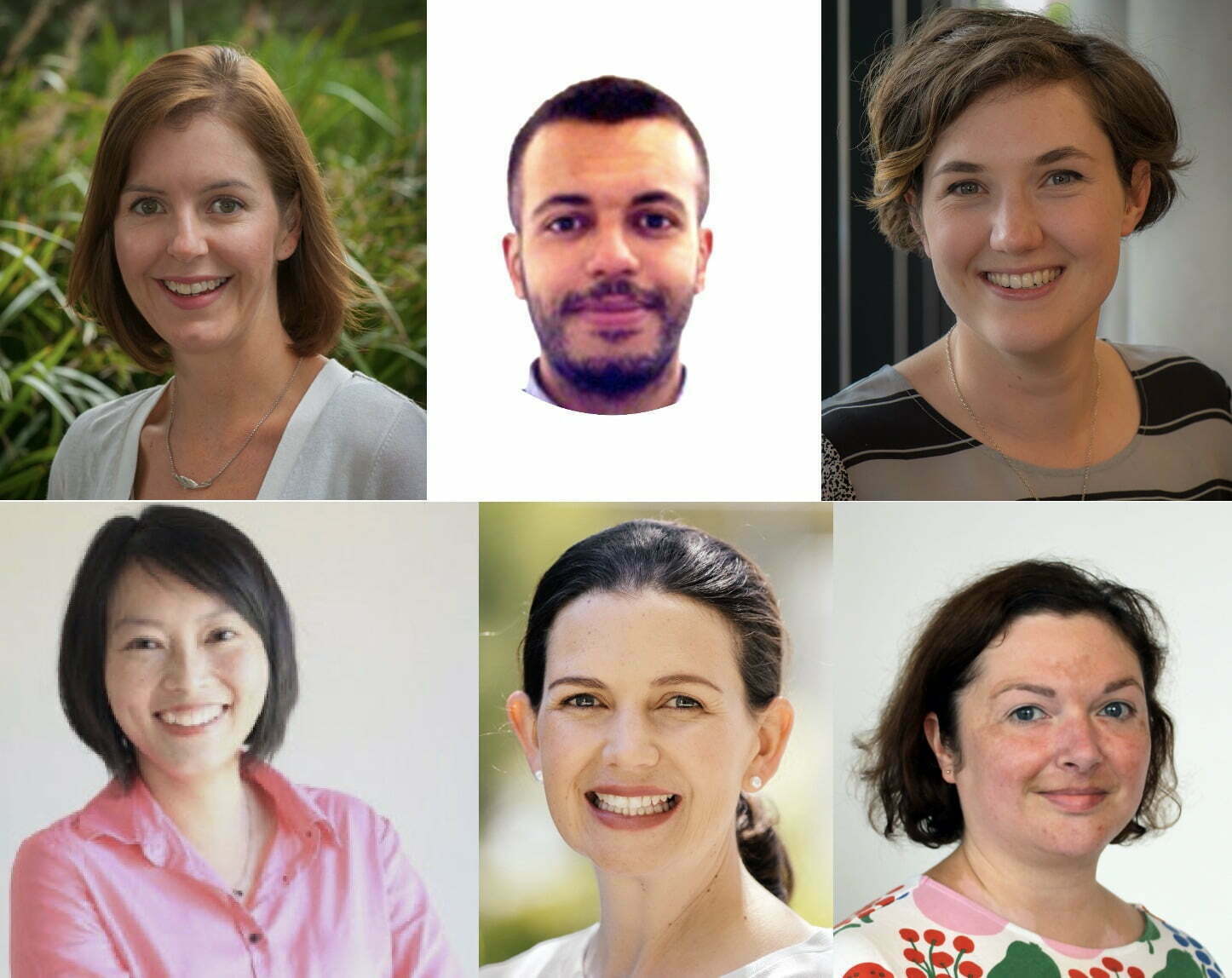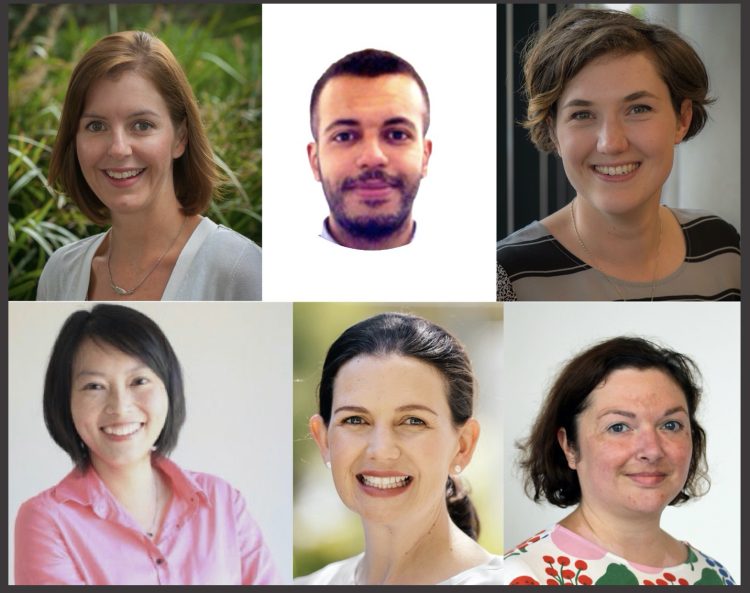Early to mid career researchers, seeking better career pathways. Photos provided
As symposium spotlights public health workforce concerns, young researchers call for action
- Melissa Sweet
- Tara Boelsen-Robinson and colleagues
- Monday, December 6, 2021
Originally published on 7 December 2021 by Croakey Health Media:
Introduction by Croakey: Hundreds of health leaders are expected to participate in an important symposium on the nation’s public health workforce tomorrow (Tuesday, 7 December).
The symposium, hosted by The Public Health Association of Australia (PHAA), Australasian Faculty of Public Health Medicine (AFPHM) and National Aboriginal Community Controlled Health Organisation (NACCHO), will bring together experts from state and federal governments, academia and service providers to address public health workforce concerns.
It comes just the week before the launch of the long-awaited National Preventive Health Strategy, on 13 December.
Adjunct Professor Terry Slevin said in a statement that National Cabinet had twice committed to advance investment in public health workforce, “but so far nothing has happened”, and action is now urgently needed.
Dr Megan Campbell from NACCHO said it was essential to strengthen the cultural safety and Aboriginal health expertise of the public health workforce.
Professor Robyn Lucas, President of the AFPHM, said: “Public health doctors have never been more prominent in Australia – yet there is an urgent undersupply of qualified public health physicians. Unless this is addressed and training positions funded and filled, there risks a major leadership vacuum.”
Meanwhile, in the article below, a group of early and mid-career researchers propose some innovative solutions to address a crisis in the public health research workforce, including the establishment of Prevention Fellowships.
The authors are from organisations participating in the Collaboration for Enhanced Research Impact: Dr Tara Boelsen-Robinson, Dr Shaan Naughton, Dr Alexandra Chung, Dr Victoria Brown, Dr Konsita Kuswara, and Dr Driss Ait Ouakrim.
Tara Boelsen-Robinson and colleagues write:
By world standards, Australia has done an enviable job of reducing the devastating impact of the COVID-19 pandemic, as well as of other preventable causes of death and injury such as smoking, car accidents and gun violence. These gains would not have been possible without an army of public health advisors – a workforce that is among the most respected in the world.
The pandemic response has seen substantial investment in public health workers, with hundreds of new people employed to help with contact tracing, for example. We have learned that public health requires a multisectoral approach and our knowledge is relevant to many other sectors. Our research will have important ramifications for the next (inevitable) pandemic, and it will be essential to maintain our public health corporate memory.
It is concerning, then, that instability of research funding in Australia and unhealthy working environments are resulting in a dramatic loss of our early career public health researchers – those of us who have completed our PhDs and are working as early career academics.
Long-term job insecurity, chronically underfunded and undervalued public health research opportunities, and the casualisation of the university workforce are ongoing issues that have been thrown into stark relief during COVID-19.
Upheavals
The result has been huge upheavals to the academic sector, which have placed early career researchers like us, particularly those with young families, under enormous pressure (see, for example, these publications: Australian Academy of Science, Christian, 2020, de Wendi 2021).
A major key performance indicator of our academic institutions – PhD student completions – ensures a steady stream of newly minted PhDs to conduct the majority of research. After our doctorates, we are thrust into a workplace that will not offer financial or job security, now or in future years, and requires us to compete ferociously in a system that rewards less than 15 percent of our best and brightest with short-term sources of income.
It is particularly challenging for early career researchers with caring responsibilities, who are primarily female. Many of us plan our families around our fellowships so that we can access parental leave with a job to come back to afterwards.
There’s no time to slow down while we’re juggling small children; it’s now that the pressure is on to continually publish to prove our worth, and write grants that have little chance of success – anything to sustain our jobs for the next few months.
Securing external research funding has never been more competitive. While that’s true for everyone, those of us with shorter track records are particularly vulnerable as we are dependent on securing our first funding to establish our academic careers.
At the same time, a re-imagining of NHMRC grant schemes seems to have led to the perverse result of an explosion in applications, with success rates at discouragingly low levels and less than a third awarded to public health or health services research. As a result, hundreds of early and mid-career researchers are left wondering where their future pay cheques might come from.
Growing job insecurity
Industry-sponsored grants are few and far between in the public health sector, where industry engagement usually means working closely with government at all levels, rather than with commercial companies and actors.
Partnering with commercial organisations is particularly risky for researchers in public health due to reputational risk, so is simply not a viable option. For these reasons, the focus by universities on industry funding for research often excludes areas like the prevention of chronic disease.
A relative dearth of non-government or philanthropic funding schemes again reflects a sector for which all Australian citizens have a need, but where money on the ground is spread thinly over a multitude of worthy causes.
Meanwhile, COVID-19 continues to cause a major shift in the business model of Australian universities. The decision to exclude universities from JobKeeper has led to ever tighter university budgets and further job insecurity.
With administrative and support staff job losses comes further pressure on the researchers left behind to perform administrative tasks on top of their research, all the while maintaining (and hopefully excelling at) the competitive grant application cycle.
All of this leads to intelligent, passionate early to mid-career researchers reconsidering their next career moves – out of their field, out of the country, out of academia entirely.
Most of us work in public health because we love science and are passionate about wanting to make a difference to the health of Australians through research. Yet more than 50 percent of early career researchers working in STEMM (Science, Technology, Engineering, Mathematics and Medicine) believe that structural challenges over personal ones are going to limit their ability to maintain a research career in the long term (Christian, 2021).
We are not the first to point out systematic challenges with research careers in Australia.
But now the stakes are higher than ever. At a time where the value of disease prevention and evidence-informed public health decision-making have never been more evident, we are facing a crisis point for prevention research in Australia.
Ways forward
We have submitted a plan to the Medical Research Future Fund (MRFF) calling for a specific stream of funding within the fund for public health and in particular chronic disease prevention research.
We would like the establishment of Prevention Fellowships to support capacity building of prevention and public health early to mid-career researchers, and longer-term project grants or options to increase job security for postdoctoral researchers.
We also support the trialling of research-policy-practice fellowships for prevention. These could be established as joint initiatives between universities and government – similar to what many state health departments have with conjoint clinical positions.
Such roles would provide some job security and new opportunities to embed and translate knowledge and evidence about prevention into government programs, policies and services.
There must also be increased funding support for universities so they are not caught in the cycle of producing PhDs with no job prospects. Universities must prioritise longer term contracts and tenured positions for early and mid-career researchers, and place far less reliance on casualisation of the workforce.
These measures to provide sustainable and attractive career opportunities will ensure a pipeline of trained public health researchers – and the prioritisation of public health for the good of all in Australia.
Authors

From Top L: Dr Victoria Brown, Centre of Research Excellence In the Early Prevention of Obesity in Childhood (EPOCH CRE); Dr Driss Ait Ouakrim, Centre of Research Excellence on Achieving the Tobacco Endgame; and Dr Tara Boelsen-Robinson, Centre of Research Excellence in Food Retail Environments for Health (RE-FRESH).
From Bottom L: Dr Konsita Kuswara, Centre of Research Excellence In the Early Prevention of Obesity in Childhood (EPOCH CRE); Dr Alexandra Chung, Centre of Research Excellence in Health in Preconception and Pregnancy (CRE HiPP); and Dr Shaan Naughton, Centre of Research Excellence in Food Retail Environments for Health (RE-FRESH).
These researchers are from a wider group of early- to mid-career researchers from eight organisations participating in the Collaboration for Enhanced Research Impact.




